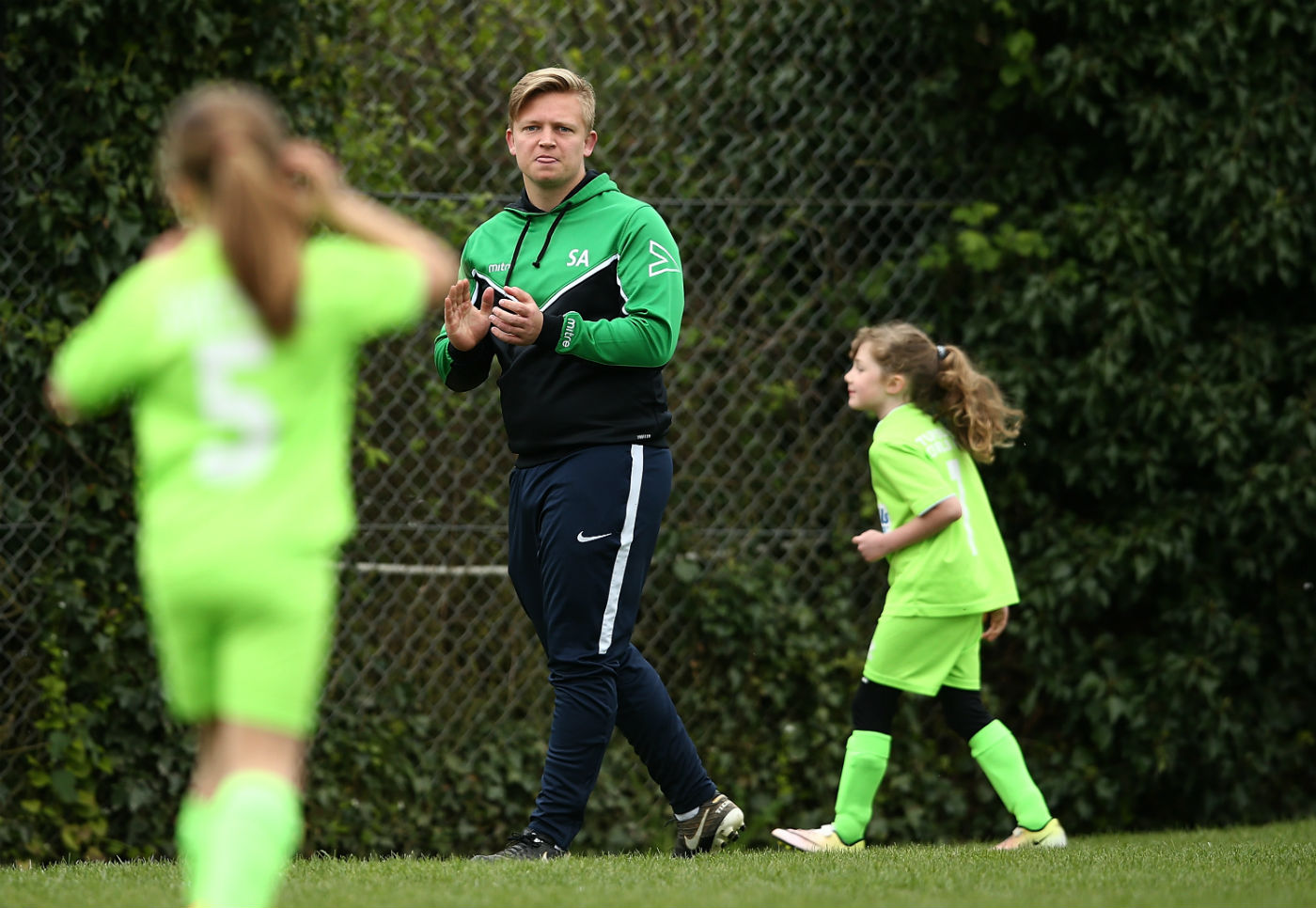Top tips

15 ways you can improve your communication skills
- Sam Griffiths
- 31 December 2017
FA coach mentor, Sam Griffiths, provides a list of top tips to help you improve your communication skills.
1.Consider your terminology
Young players may not have the knowledge or experience to understand phrases like: ‘drop off’, ‘squeeze’ or ‘get tight’. Instead, try and use words and phrases that children will understand: ‘move back’ ‘move forwards’ or ‘stand close to a player’ might be more appropriate.
2. Think about the message your body language sends
Never underestimate the power of body language. Simple things like a thumbs up, a smile or a high five can sometimes mean so much more to players than saying something. On the flip side, players will pick up on negative body language, especially on a matchday. Be aware of how you react when they lose the ball or concede a goal. Stay positive and be conscious of how you react.
3. Listen to your players
One of the most important aspects of communicating is listening. If you ask a question and you don't get the answer you hoped for, don't dismiss the child’s contribution. Instead, make a point of valuing their input: “that’s a great answer, I hadn't thought about that”. Listen to understand, not to reply.
4. Don't interrupt
Children, regardless of age, may not always express themselves quickly or clearly, so don't become impatient with those who can’t get their point across. Instead, gently guide them to be more precise and help them explain their point in more detail.
5. Be aware of your tone of voice
One of the basic elements of communication is how you sound to others. Using different tones of voice will help players differentiate when you are being serious and when you are having some fun. A change in tone of voice for positive reinforcement can also help a player feel a sense of achievement.
6. Drop your volume
Talking quietly can be an effective technique to get the players to stop talking and listen to you. By refusing to shout above them they will have to stop talking if they genuinely want to hear what you have to say.
7. Find different ways to connect
Try to relate your communication to the age and stage of the players that you are working with. For the younger children you may link to superheroes, for older players it might be footballers. Whatever it is, young children like to think they can act like their role models and it is an effective way of engaging with your group.
8. Use questions to check learning
Asking questions can help you get a better understanding of player learning. Asking for clarification or further explanation can reassure you that the players understand what they are doing and why.
9. Vary your communication tools
Visual aids such as a whiteboard, tactics board or cones on the floor can help get your message across more effectively than just talking to the players. Also, consider how you can utilise technology to get your message across to players. Lots of coaches are using iPads and other technology to communicate and it is something that young players can relate to and engage with.
10. Understand the individuals in your group
Some of the players in your group will be comfortable talking and responding to your questions, whereas others may be more comfortable drawing something out on the whiteboard or moving pieces on the tactics board. Not every child has the confidence to talk in front of a group and so it is important to value all forms of response and communication.
11. Keep a narrow focus
Changing multiple aspects of your coaching at the same time is a difficult task. If you want to improve your communication skills it is important to solely focus on that aspect of coaching. Aim to improve your communication over a 4-6 week block and don’t worry too much about the other aspects of your delivery.
12. Ask for help
Ask your co-coach, a parent, or a friend to make a note of how long you’re talking for during a session and ask them to feedback to you at the end of the session. You could also ask them to make a note of how long the kids talk for compared to your input. Filming some of the session on their phone will help. The footage or figures can be illuminating and can prove to be a lightbulb moment for developing your communication. We often don’t know what we do, until we see it.
13. Make praise specific
I think we have to be careful not just to say ‘well done’ on repeat throughout the session. Instead, say what was good. If we are going to give praise add some detail: "Well done, that turn was brilliant as it really put the defender off balance.” The kids can then learn what was good about their action. If you overuse praise it can become devalued.
14. Plan for your communication
If you are practising how to give individual challenges have a think about how many kids you’re going to work with before the session starts – don’t set unachievable targets. Similarly, you can also plan the length of your coaching points. A useful challenge is trying to edit your coaching points to the length of a tweet, ensuring your points are concise and impactful.
15. Give yourself time
With all of the ideas outlined above it is really important that you give yourself time to learn and get better. Coaches will sometimes try something for one week, think it hasn’t worked, and then give up. Instead, you should see improving your communication skills as a long-term project.































